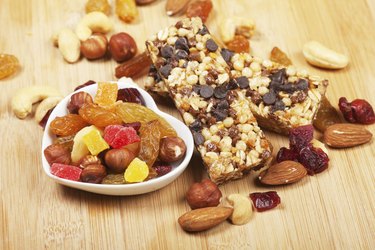
Food labels often offer up a sea of unpronouncable words. Maltodextrin and dextrose are two that may give you pause, but both are ingredients derived from natural sources, and the U.S. Food and Drug Administration categorizes them as "generally recognized as safe," or GRAS. These additives are present in numerous processed foods to provide texture and sweetness.
What's Maltodextrin?
Video of the Day
You might find the ingredient maltodextrin on the labels of cereal bars, granola, chips and other snack foods. It's a simple starch that's easily digested and acts as a filler or texture enhancer. Manufacturers usually create it from corn, rice or potato starch and add enzymes to break it down until it forms a white powder. In countries other than the United States and Canada, wheat or barley starch may be used to create maltodextrin.
Video of the Day
About Dextrose
Dextrose is the simple sugar that gives fruit and honey a sweet taste. It's a primary ingredient in corn syrup and is often added to processed baked goods as well as cake mixes, frostings, sweet and savory snack foods, and custard and sherbet desserts. Manufacturers also use it as a filler in artificial sweeteners. Dextrose browns well, so it improves the appearance of baked goods' crusts. It's usually derived from cornstarch. You may see it as "dextrose anhydrous" or "anhydrous dextrose" on a food label.
Health Concerns
Dextrose is a completely natural product but doesn't supply any nutrients. Eating too much of it may cause weight gain and tooth decay. Maltodextrin has no known adverse health effects. If you have a wheat allergy, however, scrutinize labels that contain maltodextrin carefully. Foreign sources of maltodextrin may contain wheat, according to the watchdog organization Center for Science in the Public Interest.
Processed Products
Although dextrose and maltodextrin are basically safe, consuming a lot of foods with these ingredients may be an indication that you aren't getting enough fresh, whole products in your diet. An occasional bar or handful of snack mix is fine, but relying on these foods for regular meals means you might be missing out on fresh vegetables and fruits as well as lean proteins, low-fat dairy and unprocessed whole grains, such as quinoa and brown rice. Whole foods contain naturally occurring vitamins and minerals and fiber, all of which promote good health.
- Center for Science in the Public Interest: Food Additives
- Bob's Red Mill: Maltodextrin, Dextrin and Dextrose Demystified
- U.S. Food and Drug Administration: Database of Select Committee on GRAS Substances (SCOGS) Reviews
- U.S. Food and Drug Administration: CFR - Code of Federal Regulations Title 21
- The Sugar Association: Other Caloric Sweeteners